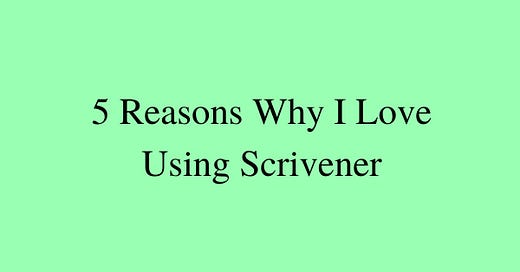5 Reasons Why I Love Using Scrivener
On the fence about the writing software? Here's how it works for me!
I gave Scrivener a try in 2016 on a whim and I’ve never looked back. There’s so much I love about it and it suits the way I write so well. Here are just five reasons why I use it for every novel.
This post isn’t sponsored - this is just me sharing a bit of my writing process!
I write out of order
This is the biggest reason why I love Scrivener: it suits my writing style. I’m a planner who writes out of order, so Scrivener’s ability to create individual scene documents really suits me. If I’m stuck on a particular scene I can move on to one I feel more confident about and move scenes up and down or from chapter to chapter. I like being able to see my whole novel ahead of me and jump around it depending on what I feel like writing. Having each scene as an individual entity also feels easier to build with its own time, weather, and beginning, middle, and end.
There’s a spot for character and setting
One of Scrivener’s features is a dedicated space for character and setting. It comes with a template or you can create your own. It just has simple prompts like physical descriptors, habits and mannerisms, and internal and external conflicts for character, and unique features, sights, smells, and season for setting. I like having everything in one space and I can just scroll down to review a character or place, rather than open another document or flip through one of my many, many notebooks. You can add photos for inspiration too!
There’s an app for that
This is definitely not a necessity, but I love to use it. You can buy the Scrivener app for your phone and it syncs with your computer. It’s $30 so definitely on the pricey side, but it’s a one-off payment and I find it’s worth it. I feel weirdly powerful having a handful of my novels on my phone that I can work on at any time (and if you see me staring intensely at my phone on public transport, I’m probably writing… or on Instagram.)
The resources
I honestly think I only use about 30% of what Scrivener can do. It has a whole bunch of resources available. There’s a built-in dictionary and even a name generator with lots of different options to choose from. The resource I use the most is the word tracker. You can set goals (for NaNoWriMo, for example, it’s always set to 50,000 words for the project and 1,667 words daily), or just use it as an easy way to see how many words you’ve written in a session (instead of remembering the amount you started with and subtracting from your final word count). Scrivener is also not just for novels - there’s templates for screenplays, comics, and essays.
The creation of other documents
While you can bind a bunch of chapters together to make your manuscript, you can also create other folders and documents that exist outside the manuscript (so they’re not included in the compile to a Word document or PDF.) I use these all the time as places to brainstorm, plot, write notes, and - more recently - create short stories that are little spin-offs or experiments from the novel, like writing missing moments for fun or a scene from another character’s perspective to get to know them. (This is not procrastination, it’s research… I think.)
Can’t write my novels without Scrivener! Do you use it? If not, how do you write your novels?
Happy writing!
Try Scrivener for yourself and I’ll even receive a little commission if you do!





I don't know what I'd do without Scrivener! The compile feature was actually a lifesaver when querying, and agents wanted submissions formatted all kinds of different ways.
I think I'm using less than 30% of its features, but I love Scrivener too, and have been using it for years. I particularly love it for all the different styles of templates that I find around the writerly webs.